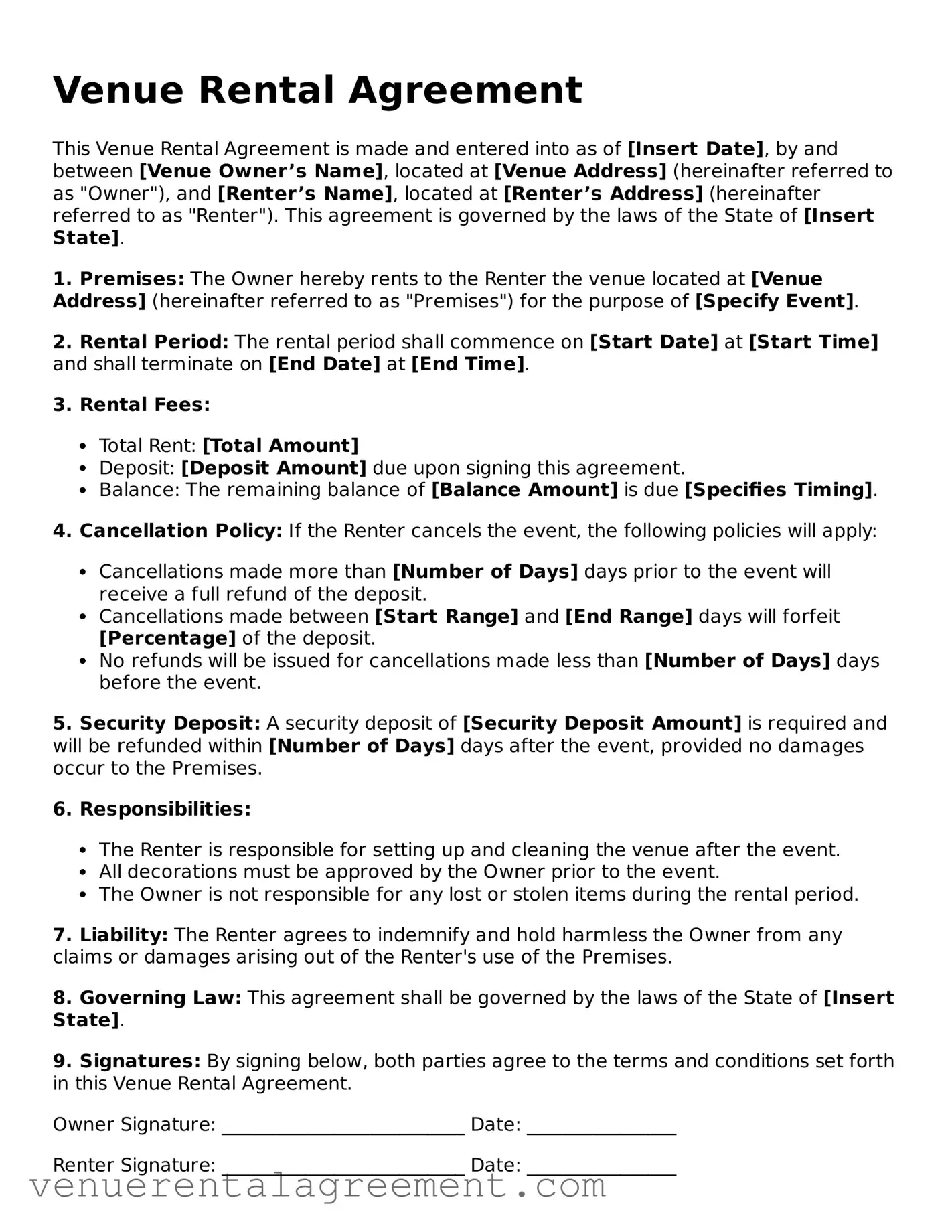The first document similar to a Venue Rental Agreement is the Lease Agreement. Both documents outline the terms under which one party can use a property owned by another. A Lease Agreement typically pertains to residential or commercial properties, detailing the duration of the lease, rental payments, and responsibilities of both parties. Like the Venue Rental Agreement, it serves to protect the interests of both the landlord and tenant, ensuring clarity on usage rights and obligations.
Another document is the Service Agreement, which is often used in conjunction with venue rentals when services such as catering or audiovisual support are required. This document specifies the services to be provided, the timeline for those services, and payment terms. Similar to the Venue Rental Agreement, it establishes expectations between the parties involved, helping to prevent misunderstandings and disputes.
The Event Planning Agreement is also akin to a Venue Rental Agreement. This document focuses on the details of an event, including the venue, date, and specific requirements. It outlines the roles of both the event planner and the venue owner, ensuring that all parties are on the same page regarding logistics. Like the Venue Rental Agreement, it emphasizes the importance of communication and clarity in planning successful events.
A Catering Agreement shares similarities with a Venue Rental Agreement, particularly when food services are involved in an event. This document details the menu, service times, and payment arrangements. Both agreements aim to ensure that the event runs smoothly, with clear expectations set for the services to be provided. They help prevent any last-minute surprises that could disrupt the event.
The Equipment Rental Agreement is another related document, especially for events requiring additional equipment such as sound systems or lighting. This agreement specifies the equipment to be rented, the rental period, and any associated costs. Like the Venue Rental Agreement, it helps define responsibilities for care and return of the equipment, ensuring that both parties understand their obligations.
A Non-Disclosure Agreement (NDA) can also be relevant in the context of venue rentals, particularly for events that require confidentiality. This document protects sensitive information shared between the venue owner and the event organizer. Both the NDA and the Venue Rental Agreement serve to safeguard the interests of the parties involved, ensuring that proprietary information remains confidential.
The Memorandum of Understanding (MOU) is similar in that it establishes a mutual agreement between parties regarding the use of a venue. While less formal than a contract, an MOU outlines the intentions and expectations of both parties, much like a Venue Rental Agreement. It can serve as a precursor to a more detailed agreement, helping to clarify the relationship before formalizing terms.
A Sponsorship Agreement can also resemble a Venue Rental Agreement, particularly when a venue is used for promotional purposes. This document outlines the terms of sponsorship, including branding opportunities and financial contributions. Both agreements focus on the relationship between the venue owner and the party using the space, emphasizing the importance of clear terms to ensure mutual benefits.
The Terms of Service document is another relevant comparison, especially for venues that offer online booking. This document outlines the rules and guidelines for using the venue's services. Like the Venue Rental Agreement, it sets clear expectations for both the venue and the user, helping to mitigate potential conflicts and ensuring a smooth transaction process.
Lastly, the Rental Application form can be seen as a preliminary document related to venue rentals. This form collects essential information from the prospective renter, such as contact details and event specifics. While it does not serve as a binding agreement, it initiates the rental process and helps the venue owner assess suitability, similar to the initial stages of a Venue Rental Agreement.
